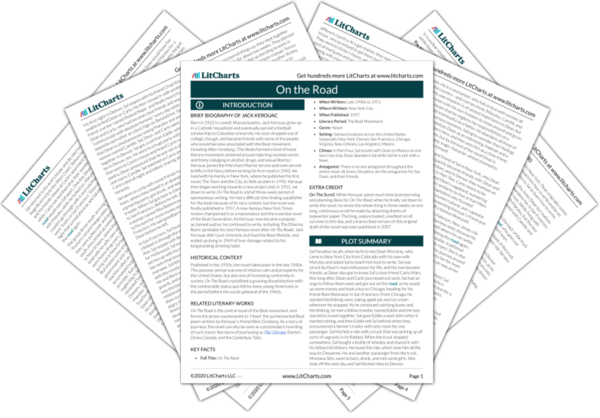Freedom, Travel, and Wandering
Each part of Kerouac’s novel—until the short, concluding Part Five—tells the story of a journey, and its title emphasizes the importance of traveling, of being on the road whether riding, driving, or hitchhiking. Travel is hugely important to Sal and his companions, largely because it is associated with a kind of freedom and a sense of possibility. When Sal takes off to travel across the country, he is exercising his freedom to go anywhere, not…
read analysis of Freedom, Travel, and WanderingSociety, Norms, and Counterculture
On The Road was hugely important to the Beat movement, a countercultural artistic and literary movement of the 1950s, and still appeals to rebellious spirits today. Kerouac’s characters eschew the norms of mainstream society and live how they want, without regard for the law, manners, or social niceties. Sal and his friends indulge in drugs, heavy drinking, and casual sex, while Dean marries, divorces, and abandons several women. They steal food and cars, drive like…
read analysis of Society, Norms, and CountercultureFriendship
As much as it is a novel about journeying, On The Road is also a novel of friendship. To whatever extent Sal and others form a coherent “movement,” it is not an official club or organization, but is simply a loose community brought together by various ties of friendship. Wherever Sal goes, he thinks of friends he can call up to stay with, go out with, or drink with. The narration often casually drops the…
read analysis of Friendship
Writing
Along with several other of his friends, Sal is a writer. In fact, Dean first comes to Sal to learn how to write. Part of the way in which Sal and his friends rebel against mainstream society is in dedicating themselves to modern, experimental writing and creative pursuits rather than to traditional jobs. This aspect of On The Road is often read autobiographically, so that the novel can be seen as, in some way, about…
read analysis of WritingAmerica
Among other things, On The Road is a portrait of mid-twentieth century America. As Sal wanders, drives, walks, rides, and hitchhikes all around the country, he sees all sorts of different sides of the country—from small towns to big cities, from east to west (and everything in between), north and south, opera houses and poor “housing-project shacks.” Even Part Four, when Sal ventures into Mexico, serves largely to illuminate America by contrast. Sal’s urge to…
read analysis of AmericaPrivilege and Prejudice
The ideal world of Sal and his friends is one of freedom—from obligations, from the law and police, from being tied to any one place or even any one woman. But all this has a flip-side: Sal and Dean’s freedom is often predicated on others’ lack of freedom, and is generally only attainable because of their privileged status as white males in America. On The Road often uses marginalized or minority groups to emphasize the…
read analysis of Privilege and Prejudice






